Your guide to ETFs, unit trusts, and listed shares
*This content is brought to you by Brenthurst Wealth
By Maria Smit *
As a financial advisor, I often get asked about the most effective investment methods. Investing can initially seem complex, but with the right information, it becomes a powerful tool to help secure your financial future.
In this article, I want to highlight three popular investment options: Exchange-Traded Funds (ETFs), unit trusts, and shares. I'll cover the fundamentals of each, the associated risks, costs involved, and ideal time horizons so you can make informed decisions.
Understanding risk
The notion of risk is fundamental to investing. Different investment types come with different degrees of risk that usually reflect the potential returns: more risky investments tend to offer better returns. In comparison, less risky ones generally produce lower returns.
ETFs: These are usually low to moderate-risk investments. Designed to track an index or a basket of assets, ETFs provide inherent diversification. They are generally well-suited for investors who prefer steady growth and are risk-averse. While they might not offer spectacular returns, they provide a cushion against significant losses.
Unit Trusts: The risk profile of unit trusts can range from low to high, depending on the underlying assets and the fund manager's strategy. By pooling your money with other investors, you can access a diversified portfolio even with a small investment amount. If you're new to investing or prefer to leave the decision-making to professionals, unit trusts are a good starting point.
Shares: Buying shares means you own a piece of a company. As a shareholder, your fortunes will rise and fall with the company's performance, making this a higher-risk option. However, the flip side is that the potential for returns is also high. This investment vehicle is best suited for those who thoroughly understand the market and are willing to take calculated risks.
Cost considerations
Fees and costs are inevitable in the investing world, and understanding these is essential to calculate your net returns accurately.
ETFs: ETFs typically have lower expense ratios than other investment vehicles. Also, because they trade like shares, you may have to pay a brokerage fee. However, these costs are generally lower than unit trusts and shares.
Unit Trusts: These usually come with annual management fees, which can eat into your profits. Some funds also charge entry or exit fees. Always check the fee structure before investing, as high fees can significantly impact your returns.
Shares: When investing in shares, brokerage fees are your primary expense. These fees can add up quickly if you trade frequently. Moreover, when you sell your shares at a profit, owning shares may have tax implications, such as capital gains tax.
Time horizon
Your investment time horizon—how long you can leave your money invested—is another critical factor to consider.
ETFs: Their liquidity makes them suitable for short-term and long-term investment goals.
Unit Trusts: These are usually better suited for medium to long-term investments, especially if you want to benefit from the power of compound growth.
Shares: These are typically best for long-term investment. Despite the daily price volatility, a long-term view can yield significant returns, especially if you reinvest dividends.
Take your first steps
For Beginners: ETFs and unit trusts are excellent entry points into investing. They offer the benefit of diversification and lower risk, making them ideal for those still learning the ropes.
For the experienced: If you're familiar with the market dynamics, investing in shares can be rewarding. However, it's a hands-on investment that requires continuous monitoring and a robust understanding of market trends.
Your choice between ETFs, unit trusts, and shares should align with your financial goals, risk tolerance, and investment horizon. This article has touched broadly on what you need to know but is far from comprehensive.
If you're serious – or even just curious – about investing for your retirement, you should talk to a qualified, experienced advisor to discuss options best suited to your specific goals. Investing wisely is the cornerstone of financial security and long-term wealth creation, which becomes much easier if you have a trusted advisor you can lean on.
* Maria Smit CFP® professional is an advisor at Brenthurst Pretoria maria@brenthurstwealth.co.za

